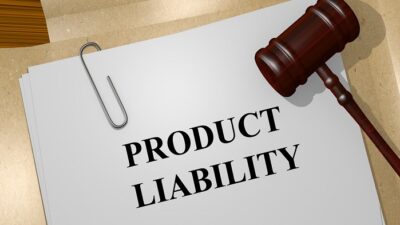Weed-killing products are often used to keep our lawns and gardens free of weeds, but these products can have negative effects on the environment and our health.
For example, Glyphosate, the active ingredient in popular weed-killing products like Roundup, is widely used to control weeds in lawns and gardens. Glyphosate works by inhibiting an enzyme that is necessary for plant growth, eventually leading to the death of the plant. However, studies have linked glyphosate to negative health effects in humans.
Glyphosate has been classified as a “probable human carcinogen” by The International Agency for Research on Cancer (IARC). Research conducted by the University of Washington found that using glyphosate can significantly increase the risk of non-Hodgkin lymphoma. The study analyzed the results of previous studies on the topic and found that exposure to glyphosate increased the risk of non-Hodgkin lymphoma by 41 percent.
As of 2023, the Roundup lawsuit update is that thousands of people have filed lawsuits against Monsanto, the company that originally manufactured Roundup, and its parent company, Bayer AG.
In this article, we will discuss some tips for reducing the use of weed-killing products and how proper lawn care and weed prevention techniques can help keep ourselves and our gardens healthy and weed-free.
Table of Contents
Proper Lawn Care
One of the best ways to reduce the need for weed-killing products is to maintain a healthy lawn. A healthy lawn is less susceptible to weed growth and will naturally crowd out weeds. Here are some tips for proper lawn care:
- Mowing: Studies have shown that mowing alone can significantly reduce weed pressure, even in the absence of pre-emergent herbicides. This is because taller grass shades the soil, which can prevent weed seeds from germinating. In addition, taller grass can have deeper root systems, which can help the lawn compete more effectively with weeds for nutrients and water.
Mowing should be done at least once a week during the growing season, and the height of the lawn should be set to the appropriate level for your grass type.
- Watering: Lawns should be watered deeply and infrequently. This will encourage deep root growth, making your lawn less susceptible to drought and weed growth. Most lawns require one inch of water per week, which can be achieved through one deep watering or multiple light waterings.
- Fertilizing: A well-fed lawn is a healthy lawn. Proper fertilization will encourage healthy growth and discourage weed growth. Fertilization should be done at the appropriate times and with the appropriate amount of fertilizer for your grass type.
- Aeration: Aerating your lawn will help to loosen compacted soil, improve water and nutrient absorption, and promote healthy root growth. A healthy lawn with deep roots is less susceptible to weed growth.
Weed Prevention Techniques
Preventing weeds from growing in the first place is another way to reduce the need for weed-killing products. Here are some weed prevention techniques:
- Mulching: Mulching your garden beds and around trees and shrubs will help to suppress weed growth by blocking sunlight and reducing soil moisture. Organic mulches like shredded leaves, bark, or compost are preferred because they also improve soil health and provide nutrients to plants.
- Hand Weeding: Hand weeding is an effective way to remove weeds from your lawn and garden. It is best to pull weeds out when they are young and before they have a chance to lay seeds.
- Using Landscape Fabric: Landscape fabric can be used to prevent weed growth by blocking sunlight and preventing weeds from germinating. It should be used under mulch or decorative stones to be effective.
- Companion Planting: Companion planting involves planting two or more plant species together with a mutually beneficial relationship. For example, planting clover with your grass can help fix nitrogen in the soil, which will help your grass grow and prevent weed growth.
Natural Weed-Killing Products
If you do need to use weed-killing products, there are natural alternatives that are less harmful to the environment and our health. Here are some natural weed-killing products:
- Vinegar: For tough, perennial weeds, a 20% vinegar solution can be an effective natural alternative to traditional weed-killing products. It is sometimes called horticultural vinegar and can be found in garden centers, farm stores, or online. It’s important to note that this type of vinegar is much stronger than regular vinegar, which typically has a 5% acidity level. It is important to only apply the solution to the weeds and avoid spraying any surrounding plants or grass.
- Salt: Salt is another natural alternative to traditional weed-killing products. As salt dehydrates plants and disrupts the internal water balance of their cells, weeds are killed. Because salt is highly toxic to all plants, it’s important to exercise caution when using it to kill weeds.
To apply salt to weeds, it’s most effectively used when mixed with water, as this makes it easier for the weeds to absorb. It’s important to note that applying salt directly to soil can also harm beneficial soil organisms and damage soil structure, which can lead to long-term soil health issues. Therefore, it’s best to apply salt solutions only to the weeds themselves.
- Corn Gluten Meal: Corn gluten meal is a natural pre-emergent weed killer that prevents weed seeds from germinating. It is safe to use around people and pets and can also be used as a fertilizer.
In conclusion, reducing the use of weed-killing products is an important step in protecting the environment and our health. Proper lawn care and weed prevention techniques can help keep our lawns and gardens healthy and weed-free, and natural weed-killing products are available if needed. By implementing these best practices, we can reduce our reliance on harmful chemicals that can negatively impact the environment and our health.















Comments